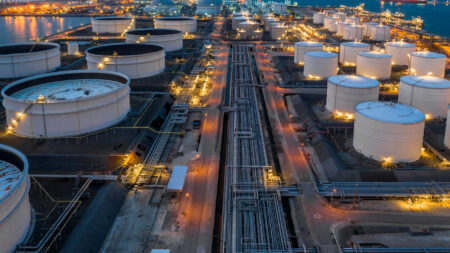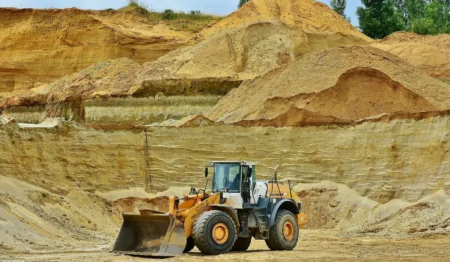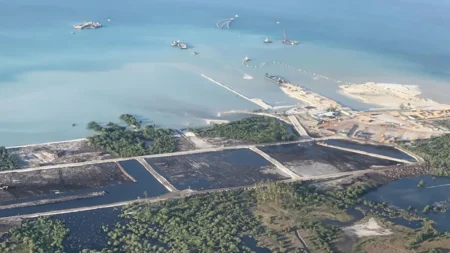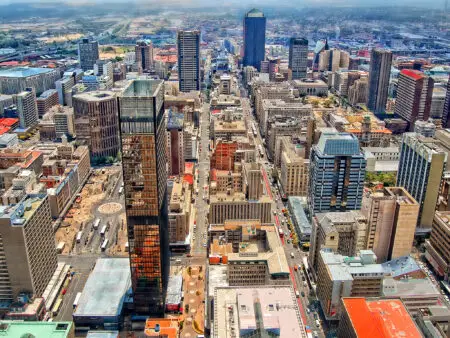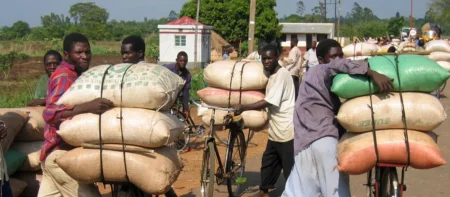- Africa’s new dawn: the rising role of digital and AI in agriculture
- Can Dangote Refinery Transform Africa Energy Ambition
- Gallup Survey: 80 per cent of Kenyan Workers Are Disengaged and Seek New Opportunities
- Madagascar Man Freed from 5KG Tumor After 15-Year Struggle
- How women in Africa are perceived and treated
- Sugar consumption in Kenya to Increase to 1.23 Million Tonnes
- Can Somalia and Turkey Oil deal Bring Change in Somaliland
- Remittances to Kenya dropped to $371.6 million in June, marking a six month low
Browsing: Mozambique
- The continent’s abundant resource base and untapped opportunities have already begun to attract European Investors, countries, and companies.
- Clear transition strategies and enhanced regulatory frameworks consolidate Africa’s attractiveness as an investment destination.
- With the resources available, many African countries – either oil producers or those on the verge – have begun implementing strategies to define a long-term vision for the sector.
Amid supply challenges and efforts to diversify imports, Africa has emerged as a highly strategic investment opportunity for many European Investors, countries, and companies.
The continent’s abundant resource base and untapped opportunities have already begun to attract players from across the bloc. New market dynamics offer the chance for African countries to take tangible actions to advance the continent’s attractiveness for foreign investment.
The upcoming Invest in African Energy Forum in Paris from May 14-15 has been touted as a testament to the efforts to promote investment in the …
- Mozambique’s Green Energy Transition Strategy (ETS) to drastically reduce its dependence on fossil fuels.
- As a nation with one of the world’s lowest electricity consumption rates, Mozambique is poised to leapfrog into a new era of energy sufficiency and independence.
- Mozambique’s success or failure of this venture could offer valuable lessons for other countries grappling with the complexities of sustainable development and climate-aligned economic growth.
Mozambique’s green energy move
Mozambique has embarked on an $80 billion Energy Transition Strategy (ETS) to drastically reduce its dependence on fossil fuels. This bold initiative, set to be unveiled by President Filipe Nyusi at the COP28 international climate summit in Dubai, represents a significant pivot towards sustainable development and positions Mozambique at the forefront of the global green energy transition.
At the heart of Mozambique’s strategy is integrating 2,000 megawatts of hydropower capacity by 2030, which aims to address the country’s energy poverty and …
- East African gas has around one-third of the global average carbon content and is extremely low in liquids.
- Unni Fijaer, Vice President and Tanzania country manager for Equinor adds that the gas is ideal for meeting the world’s energy needs while minimising emissions.
- Lower carbon levels make East African Coast gas reserves more attractive to investors.
The vast gas reserves off the East Coast of Africa have significantly lower carbon content than the global average. This unique characteristic renders them more attractive to international investors and export markets amid the ongoing energy transition.
A recent panel discussion at the AOW Investing in African Energy event in Cape Town, South Africa, revealed this valuable insight. This underscores the pivotal role of African gas in the evolving global energy landscape.
East African gas reserves cleanest
“The beauty of gas derived from the East Coast of Africa is that it is extremely low …
Africa is home to nearly all the valuable minerals that are essential to generating wealth, producing commodities, and advancing technology. Approximately 30 per cent of the world’s mineral reserves are in Africa, but most mineral-rich countries remain poor with little to celebrate. Some of the key minerals found in Africa include oil, diamonds, gold, silver, copper, cobalt, coal, iron ore, uranium, and platinum.…
Indonesian businessman Iman Soerjasantosa, the manager of Búzi Hydrocarbons in Indonesia, has unveiled plans for $120 million investment in Mozambique. This investment is aimed at constructing a state-of-the-art Liquefied Natural Gas (LNG) plant.
Soerjasantosa says there is a strong willingness of Indonesian companies to invest in Mozambique, a nation that currently boasts a number of ongoing projects, including seismic studies and exploratory drilling, all designed to uncover and capitalize on additional natural gas deposits.…
- The Negomano-Roma Road was financed by the African Development Bank.
- President Nyusi finds the road reminiscent of the two nations’ Pan-Africanism aspirations.
- Road will facilitate residents with transportation services for health, education and local economic needs.
Mozambique President Filipe Nyusi has commissioned a critical cross-border link road, Negomano-Roma connection that was financed by the African Development Bank.
The road, which stands to be a key link for intensifying regional integration with Tanzania, stretches from the nation’s northern province. At the moment, the road is facilitating residents with decent transportation services for health, education and local economic needs.
Mozambique-Tanzania Pan-Africanism aspirations
Constructed under 42 months, and with the inclusion of 417 local workers under the framework of promotion and inclusion of local content, President Nyusi finds the road reminiscent of the two nations’ Pan-Africanism aspirations.
“The road is a great gain for the viability and maximization of regional integration. It is …
Oxford Economics, a renowned economic analysis firm, released a report on Thursday, shedding light on Mozambique’s inflation trajectory. After a decline and reaching levels last seen in March 2022, experts project inflation to rise to 8.8 per cent in the final quarter of 2023. The imminent return of TotalEnergies to Cabo Delgado will play a significant role in this scenario. …
- Mozambique has been given two years to improve Anti-Money Laundering Framework or face bans on international financial transactions.
- Mozambique was placed on the grey list of the FATF for non-compliance with anti-money laundering and terrorist financing.
- If Mozambique fails to comply with the FATF standards, it will be backlisted under non-cooperative countries and territories (NCCTs).
The Financial Action Task Force (FATF) has given Mozambique two years to improve its framework to prevent and combat money laundering and terrorist financing. Authorities in Maputo will suffer wide sweeping bans in international financial transactions if they fail. Currently, policymakers in the country have their feet on the gas pedal, sealing leakages in Mozambique’s financial flows.
Under pressure, the government has set up an executive committee led by Luís Cezerilo to seek Mozambique’s removal from Grey List. The listing has placed the country among the most vulnerable to crimes of money laundering and terrorism …
- Nigeria, South Africa, Egypt, Morocco, and Kenya are all expected to raise borrowing costs within the next two weeks
- In contrast, monetary authorities in countries such as Ghana and Angola, where inflation is on a downward trend, are expected to maintain current rate
- US monetary tightening could slow due to banking turmoil, weakening demand for the dollar.
Major central banks in Africa are preparing to raise interest rates in order to combat persistent inflation and prevent a sell-off in their assets exacerbated by an uncertain financial system following the recent collapse of US lender Silicon Valley Bank and stress at Credit Suisse Group AG.
Nigeria, South Africa, Egypt, Morocco, and Kenya are all expected to raise borrowing costs within the next two weeks.
In contrast, monetary authorities in countries such as Ghana and Angola, where inflation is on a downward trend, are expected to maintain current rates. Six smaller African
- Mozambique’s public debt is expected to drop below 100% in 2023, boosted by the country’s improving economic growth and higher gas revenue
- S&P Global Ratings states Mozambique’s ability to service its rising debt hinges on TotalEnergies SE’s liquefied natural gas project, which has stalled due to terrorism
- TotalEnergies is investing billions in its gas project located in the Cabo Delgado province of Mozambique
Mozambique’s external public and publicly guaranteed debt surged from 61% of GDP in 2016 to 104% in 2018, as undisclosed liabilities were exposed. This led to an unbearable debt service burden, causing Mozambique to default on its debt in 2016. Consequently, credit rating agencies lowered the sovereign’s ratings to selective or restricted default, while the World Bank and the IMF reclassified Mozambique’s external debt as “in distress.”
The revelation of the “hidden” loans had a significant impact on Mozambique, leading to a prolonged economic downturn. The country’s …







